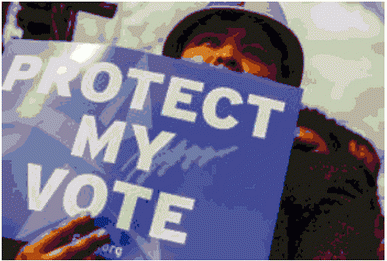By Sage Gerson
It's a shame when the very people
appointed to safeguard justice are the same people who vote to destroy one of
the most powerful equal-opportunity shields from injustice in American
history. Recently, the Supreme Court voted 5-4 to strike down Section 4 of the
Voting Rights Act (VRA), the crown jewel of the Civil Rights movement, and one
of the most famous pieces of legislation in American History.
Chief Justice Roberts stated in his
ruling that, "things have changed dramatically," implying that Section 4 is now
unnecessary. Yet, since 2000 the VRA has been invoked 74 times. in order to protect voter
equality. According to dissenting Justice Ruth Ginsberg, throwing out Section 4
is like "throwing away your umbrella in a rainstorm because you are not getting
wet."
The Voting Rights Act was passed in
1965 to ensure equality for all American voters. Tuesday's decision technically
left the VRA in place, but just barely. The Supreme Court struck down Section 4,
which designated that particular parts of the country with histories of intense
racism, like Alabama, Texas, and Arizona, must have any changes to their voting
laws cleared by the federal government before enactment, to ensure that voting
equality was preserved equally throughout the United States.
Chief Justice Roberts may believe
things have "changed' but it only took Texas two hours after Section 4 was overturned to announce plans to implement the most
stringent voter ID in the country, as well as a controversial redistricting
measure -- and five other states are moving similar legislation forward as well.
"The Court today declared racism dead in this country despite mountains of
evidence to the contrary," said J. Gerald Hebert of the Campaign Legal Center.
It is obvious the Supreme Court has
lost its connection to America's citizens. Their decision to overturn Section 4
proves how isolated they are. Benjamin Todd Jealous, President and CEO of the
NAACP -- someone who works directly with citizens to ensure racial equality --
publicly stated, that "this case comes on the heels of an election year in
which our nation witnessed the greatest assault on voting rights since the Jim
Crow era." The eradication of Section 4 means those facing racial
discrimination will lose a crucial protection, in a time where there are
millions more people of color in the United States than ever before.
Section 5 of the VRA (the section
that allows Congress to draft new rules) is still in place, suggesting Congress
could develop new guidelines to protect voters disenfranchised by the decision.
Although the decision was not couched in those words, it is clear that the
Justices understood that disenfranchisement of the voters for which the law was
intended to protect was a likely outcome, but they forged ahead anyway. To
assume any Congress in the foreseeable future would forget partisanship to
ensure voter equality lacks familiarity with reality -- most of the potentially
and newly disenfranchised voters lean Democratic.
In 2006, the last time the Voting
Rights Act was renewed, it passed by an overwhelming majority in Congress, with
a margin of 390-22 in the House of Representatives and a unanimous vote in favor
in the Senate (98-0). Republicans and Democrats alike were anxious to
improve their credibility with black and brown voters before an election. Just
six years later with partisanship at an all time high and the VRA gutted, one
must ask if the bill could even make it out of committee?
There are some that argued that
rather than striking down Section 4 of the VRA on the (ridiculous) basis that
racism is no longer relevant to voter discrimination, the Court should have expanded the law to apply to all
states,
not just the historically segregated South. Indeed, there is ample evidence
that the practices of racially targeted voter discrimination have spread well
beyond the Mason-Dixon Line.
Unfortunately, the Supreme Court has
a long history of ruling against "We the People." In the 1800s with Santa
Clara County v. the Southern Pacific Railroad, the Supreme Court chipped
away at America's democracy with their statement that corporations are people.
In Buckley v. Valeo, they decided spending money is protected political
speech, and in Citizens United v. the Federal Elections Commission, they
decided that because corporations are people and money is free speech,
corporations can spend unlimited amounts of money in our electoral process.
There is a
movement building to challenge the Court's overreach http://movetoamend.org/-- to make
clear and explicit in the Constitution that corporations are not people and
money is not speech. Such an amendment would be a good beginning -- a critical
beginning -- and a platform upon which to build a society where those with money
don't have undue control over the political, legal or electoral process. But we
also need a Constitutional Right to Vote.
If the Constitution clearly
recognized the right of all people to vote, have their vote counted, and to
meaningfully participate in the political process, communities targeted by
racist disenfranchisement measures wouldn't be at the mercy of a Court majority
whose clear agenda isn't administering justice for all or protecting human
rights.
Whether supporting corporate
"rights" over the people's Constitutional rights, or disenfranchising millions
of American voters, the Supreme Court's record in this arena is alarming.
Voting is inherent to democracy. And like unregulated campaign spending is an
affront to democracy, disabling safeguards in place to ensure equal voting is
an atrocious attack on the American democratic system. It is a sad day when the
American people must defend their democracy from the very structures put in
place to protect it.
Sage Gerson is a recent graduate
from the University of Chicago, where she is majored in English Literature and
minored in Environmental Studies. She is a social media and communications
intern for the Move to Amend Coalition.





